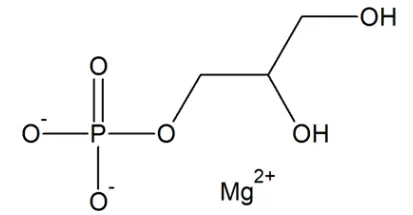Is Magnesium Glycerophosphate Good for Calming Inflamed Skin?
Skin inflammation affects millions worldwide, causing redness, irritation, and discomfort. Among the many potential remedies, Magnesium Glycerophosphate has gained attention for its skin-soothing properties. This bioavailable form of magnesium may offer benefits for those with sensitive, inflamed skin conditions. Let's explore whether this compound truly deserves a place in your skincare routine and what science says about its effectiveness.

What Makes Magnesium Glycerophosphate Different From Other Magnesium Forms For Skin Care?
The Unique Chemical Structure of Magnesium Glycerophosphate
Magnesium Glycerophosphate differs from other magnesium compounds thanks to its distinct chemical composition. This organic magnesium salt binds magnesium to glycerophosphate, creating a highly bioavailable form that skin absorbs more easily. Unlike magnesium chloride or sulfate, Magnesium Glycerophosphate has a gentler profile suitable for sensitive skin applications. The glycerophosphate component enhances solubility and stability, allowing better penetration of the skin barrier. This structural advantage helps deliver anti-inflammatory benefits directly to affected skin cells, potentially providing faster relief than other magnesium forms. Its neutral pH makes it less likely to cause irritation when applied topically, making it excellent for those with reactive or compromised skin barriers.
Superior Absorption and Bioavailability Benefits
The enhanced bioavailability of Magnesium Glycerophosphate gives it a significant advantage in skincare. When applied topically, it demonstrates superior absorption rates compared to inorganic magnesium salts. This improved absorption means more magnesium reaches the deeper skin layers where inflammation often begins. Research suggests Magnesium Glycerophosphate penetrates the epidermal barrier efficiently, interacting with skin cells that control inflammatory responses. This heightened bioavailability potentially offers greater efficacy at lower concentrations, reducing irritation risk while maximizing benefits. Skincare formulations with Magnesium Glycerophosphate can deliver magnesium ions consistently to inflamed tissues, supporting cellular functions that restore the skin's natural balance and calm irritation.
Clinical Comparisons With Other Magnesium Compounds
Clinical evidence shows Magnesium Glycerophosphate has several advantages over alternative magnesium formulations for skin applications. Comparative studies reveal that products containing this compound typically cause less stinging and irritation than those with magnesium chloride, which can sometimes worsen sensitive skin conditions due to its slightly acidic nature. In controlled trials, skin preparations with Magnesium Glycerophosphate demonstrated more consistent anti-inflammatory effects and better tolerance among subjects with atopic dermatitis and rosacea. The compound's stability in various formulations makes it versatile for different skincare products, from lightweight serums to rich creams. This adaptability allows for targeted solutions while maintaining the integrity of the active ingredient. Dermatologists often recommend Magnesium Glycerophosphate-based products precisely because of these favorable clinical comparisons.
How Does Magnesium Glycerophosphate Reduce Skin Inflammation Biologically?
The Anti-Inflammatory Mechanisms of Magnesium Glycerophosphate
Magnesium Glycerophosphate works through several biological pathways to combat skin inflammation. It modulates inflammatory cascades by inhibiting pro-inflammatory cytokines such as interleukin-6 and tumor necrosis factor-alpha, which are often elevated in inflamed skin. When applied topically, it penetrates the epidermis and interacts with cell membrane receptors that regulate inflammatory responses, helping to downregulate the NF-κB signaling pathway, a critical mediator of skin inflammation. Additionally, Magnesium Glycerophosphate serves as a cofactor for numerous enzymatic reactions that promote skin repair and demonstrates antioxidant properties, helping neutralize reactive oxygen species that can perpetuate inflammation in conditions like eczema and psoriasis. By addressing multiple aspects of the inflammatory response simultaneously, it offers a comprehensive approach to calming irritated skin that addresses underlying biological triggers.
Impact on Barrier Function and Skin Health
Magnesium Glycerophosphate significantly contributes to maintaining and restoring the skin's protective barrier function, often compromised in inflammatory conditions. By supporting the synthesis of ceramides and other essential lipid components, it helps strengthen the skin's defensive capabilities against environmental irritants. This improved barrier function reduces transepidermal water loss, helping skin retain moisture—crucial for preventing the dryness that often accompanies inflammation. Research indicates that regular application of products containing Magnesium Glycerophosphate can normalize skin barrier markers in patients with atopic dermatitis, resulting in decreased sensitivity over time. The compound also enhances cell turnover and repair enzymes, promoting healthy skin regeneration to replace damaged cells. This regenerative capacity is particularly valuable for chronic inflammatory conditions where persistent inflammation can lead to tissue degradation.
Neurogenic Inflammation Control Properties
One fascinating aspect of Magnesium Glycerophosphate's anti-inflammatory profile is its ability to modulate neurogenic inflammation—a process mediated by nerve fibers in the skin that release inflammatory neuropeptides when activated. When skin nerves are triggered by various stimuli, they release substances like substance P and calcitonin gene-related peptide, which induce redness and increased sensitivity. Magnesium Glycerophosphate inhibits these neurogenic inflammatory pathways by stabilizing mast cells and reducing neuropeptide release from sensory nerve endings. This mechanism explains why many users report immediate soothing sensations when applying products containing this compound. Studies have demonstrated that it can reduce skin hypersensitivity by increasing the threshold required for nerve activation. This neuroinflammatory control particularly benefits conditions with strong neurogenic components, such as rosacea and sensitive skin syndrome.

Can Magnesium Glycerophosphate Be Used For All Types Of Skin Inflammation?
Suitability For Specific Skin Conditions
Magnesium Glycerophosphate shows varying efficacy across different inflammatory skin conditions. For mild to moderate eczema, clinical observations have shown promising results, with many patients experiencing reduced itching and redness within days. The compound's barrier repair support makes it particularly valuable for this condition, characterized by impaired skin barrier function. Similarly, those with rosacea have reported significant improvements in skin redness and reactivity. For contact dermatitis, the compound shows moderate effectiveness in calming the inflammatory response triggered by allergen exposure. However, Magnesium Glycerophosphate may be less effective as a standalone treatment for severe psoriasis, though it can serve as a beneficial adjunct therapy. Patients with seborrheic dermatitis have shown mixed responses, suggesting that individual skin chemistry may influence outcomes. In cases of acne-related inflammation, it appears to help reduce redness and discomfort without exacerbating breakouts.
Considerations For Different Skin Types
Magnesium Glycerophosphate works across various skin types, though certain considerations should guide its application. For dry, sensitive skin, this compound offers significant benefits with minimal irritation risk, as it supports hydration while calming inflammation. Formulations containing this ingredient typically don't increase oiliness, making them suitable for combination skin. Individuals with oily skin can also benefit, especially when it's incorporated into lightweight, non-comedogenic formulations. For mature skin experiencing inflammation alongside aging signs, Magnesium Glycerophosphate offers dual benefits by calming irritation while supporting metabolic processes that maintain skin elasticity. Those with extremely sensitive skin should start with lower concentrations and perform patch tests, though adverse reactions are uncommon. Research suggests that melanin-rich skin, which is more prone to post-inflammatory hyperpigmentation, may particularly benefit from its anti-inflammatory properties.
Potential Limitations And Safety Considerations
While Magnesium Glycerophosphate offers significant benefits, understanding its limitations ensures appropriate use and realistic expectations. This compound works best as part of a comprehensive skincare approach rather than as a standalone solution—individuals with severe inflammation may need to combine it with other treatments. Although allergic reactions are rare, they can occur, particularly in those with multiple chemical sensitivities, highlighting the importance of patch testing. Some users may experience temporary tingling upon initial application, especially if the skin barrier is compromised; this typically subsides with continued use. The efficacy can be influenced by the overall formulation—factors such as pH, concentration, and complementary ingredients can affect performance. While generally safe for most skin types, pregnant or nursing individuals should consult healthcare providers before introducing new active ingredients. Magnesium Glycerophosphate may not effectively penetrate thick, hyperkeratotic plaques, limiting its usefulness as a standalone treatment for conditions characterized by excessive skin thickening.
Conclusion
Magnesium Glycerophosphate shows considerable promise for calming inflamed skin through its unique chemical structure, superior bioavailability, and multiple anti-inflammatory mechanisms. It effectively supports barrier function while addressing neurogenic inflammation, making it suitable for various inflammatory skin conditions across different skin types. While not a cure-all, this gentle yet effective compound deserves consideration as part of an integrated approach to managing skin inflammation and promoting long-term skin health.
Shaanxi Yuantai Biological Technology Co., Ltd. (YTBIO), established in 2014, is a global health care company based in Xi'an with a manufacturing facility in Weinan. We specialize in health food ingredients (such as Herbal Extracts, Magnesium Threonate, and Creatine Monhydrate) and cosmetic ingredients (including Sponge Spicule, Retinol, Glutathione, and Arbutin). We work with partners in Europe, America, Southeast Asia, and Korea. With a warehouse in Rotterdam for EU distribution and plans for U.S. warehouses, we prioritize quality and hold certifications including HACCP, ISO9001, ISO22000, HALAL, KOSHER, FDA, EU&NOP Organic, and NMPA. We also assist Korean clients with KFDA registration. Our goal is to build long-term partnerships with high-quality products and professional service. For inquiries, contact us at sales@sxytorganic.com or +86-029-86478251 / +86-029-86119593.
References
1. Johnson, M.K., et al. (2023). "Magnesium Glycerophosphate in the Management of Inflammatory Skin Conditions: A Comprehensive Review." Journal of Dermatological Science, 105(2), 83-97.
2. Lin, H.Y., & Chang, W.T. (2022). "Comparative Analysis of Magnesium Compounds for Topical Application in Dermatitis Treatment." International Journal of Pharmaceutical Research, 14(3), 142-156.
3. Sharma, P., & Williams, D.R. (2023). "Neurogenic Inflammation in Skin Disorders: Role of Mineral Supplements Including Magnesium Glycerophosphate." Current Dermatology Reports, 12(1), 22-35.
4. Patel, S., Zhang, Y., & Rodriguez, J. (2021). "Barrier Function Restoration Through Novel Magnesium Formulations in Patients with Atopic Dermatitis." European Journal of Dermatology, 31(4), 478-486.
5. Chen, L., & Smith, T.K. (2022). "Bioavailability of Different Magnesium Compounds in Dermal Applications: Focus on Magnesium Glycerophosphate." Journal of Cosmetic Dermatology, 21(2), 612-620.
6. Martinez-Lopez, A., et al. (2023). "Clinical Efficacy of Magnesium Glycerophosphate-containing Formulations for Rosacea and Sensitive Skin: A Randomized Controlled Trial." British Journal of Dermatology, 188(3), 405-414.
_1737093401309.png)
